Exhale: A Meditation
This has been an unusual year. In so many ways, this year has been a portal; a portal that opened a window into the greater Truths of our existence. It showed us who we are, who we can be at our best, and who we can be at our worst.
It also revealed the gap between our dreams, institutional promises, and our lived realities. It illuminated a schism; a kind of brutal disappointment in the very institutions and systems that we thought would serve us. We have been holding our collective breath for far too long. We must embrace the power and promise of a long, deep exhale.
As more and more people become safe from the virus, our collective sense of comfort in the world slowly and cautiously begins to return. We Exhale.
As communities work toward change together, we see the possibility of transformation in places that were previously perceived as intractable. We Exhale.
As we gather together with newfound intersectional solidarity, we feel the power of collectivity and what it means to be in community. We Exhale.
As the Spring reveals its rich fullness, we recognize that all around us change is constant and we are part of that change. We Exhale.
And those of us who have been fighting for justice…we are coming to understand that justice cannot exist outside of us until it exists with us. We Exhale.
And as we move to the close of the academic year, it is my hope that you will now allow yourself to exhale. Exhale away anything that doesn’t serve you. You can Breathe now.
Breathe for those who no longer have breath.
Breathe for those who can’t catch their breath.
Breathe for those yet to have breath.
Breathe for the planet so that she may be healed.
Breathe so that we may remember to remember who are and that freedom begins at the Exhale.
We congratulate Ashley Tarbet-DeStefano in the Elma Lewis Center for completing her MS degree in Critical Ethnic and Community Studies from UMass Boston, and Jeeyoon Kim in the Elma Lewis Center for completing her MA degree in Digital Marketing and Data Analytics from Emerson.On The Move:
It is with sadness that we inform the Emerson Community that Jeeyoon Kim will be transitioning out her role as Assistant Director for Youth Programs, and leaving Emerson. Jeeyoon played a critical role in guiding the development of some of the College’s distinct youth programs, more specifically, Creative Community Network and the Youth LEAD Sharon program. Jeeyoon has had a significant impact on the young people with whom she worked and has been a valued member of the Social Justice Center team. We extend our thanks and appreciation for Jeeyoon, as she and her partner make moves in the world. Jeeyoon, thank you for who you are and all that you have to done to create a vibrant learning community of young people. We are all better because of the time we have spent with you. Best wishes to you for what comes next in your life.
 Seed to Harvest: The Wooden Book, a touring book project where the people and communities write the pages, launched its Boston-area tour from Emerson’s Elma Lewis Center in April. Seed to Harvest: The Wooden Book is the first in a series of books that will travel throughout the United States and 14 U.S. territories collecting stories in the form of memories that will serve as medicine for its readers. In collaboration with Arts Emerson artist-in-residence, Toshi Reagon’s Parable Path Boston, the Traces/Remain ensemble is inviting people in communities to join them on a Sower’s journey that uses memories as medicine. You may submit your original content in response to one of four narrative prompts. The prompts include reflections on personal connections with trees, to memories of what you are ready to pass onto others for the purpose of healing, to what are you planting and what will you sow. Original poems, essays, short stories, articles, drawings, paintings, music, etc. may be submitted. We encourage all Emersonians to consider submitting their work. Entries may be made via email at seedtoharvestentries@gmail.com and more information can be found at artsemerson.org under programs.
Seed to Harvest: The Wooden Book, a touring book project where the people and communities write the pages, launched its Boston-area tour from Emerson’s Elma Lewis Center in April. Seed to Harvest: The Wooden Book is the first in a series of books that will travel throughout the United States and 14 U.S. territories collecting stories in the form of memories that will serve as medicine for its readers. In collaboration with Arts Emerson artist-in-residence, Toshi Reagon’s Parable Path Boston, the Traces/Remain ensemble is inviting people in communities to join them on a Sower’s journey that uses memories as medicine. You may submit your original content in response to one of four narrative prompts. The prompts include reflections on personal connections with trees, to memories of what you are ready to pass onto others for the purpose of healing, to what are you planting and what will you sow. Original poems, essays, short stories, articles, drawings, paintings, music, etc. may be submitted. We encourage all Emersonians to consider submitting their work. Entries may be made via email at seedtoharvestentries@gmail.com and more information can be found at artsemerson.org under programs. Access, Equity, & Title IX
Access, Equity, & Title IXDuring the 2020-2021 academic year, Access, Equity, & Title IX (AET) received and evaluated 110 reports, 80 of which involved prohibited conduct under the College’s Power-Based Interpersonal Violence Policy. Reports involved a wide range of behaviors, including sexual harassment, sexual assault, stalking, and relationship violence. AET authorized two requests for a formal resolution processes (investigation and adjudication) and implemented supportive measures in response to 21 reports, either at the request of students or based on an assessment by AET staff. These measures were singular or a combination of measures, including but not limited to No Contact Orders; Stay Away Directives; requests for academic, residential, or workplace modifications; policy reminders; and targeted inquiries for safety assessment.

Identity-Based Harm (Bias)
This academic year, we received 39 reports of identity-based harm, a significant reduction in the number of reports received last year (62). The classroom continues to be where a majority of harm is occurring. Experiences of harm related to ethnicity/culture, race, and gender identity/expression continue to be the most reported, as well as an increase in the number of experience of harm related to disability. Over the summer months the Social Justice Center will be in conversation with Academic Affairs, Campus Life, and Human Resources regarding additional options for reporting experiences of bias, microaggressions, and identity-based harm that will allow for direct reporting to the areas noted above while also maintaining an option of anonymity for those who report. This revised system will allow Academic Affairs, Campus Life, and Human Resources to monitor, track, and respond to experiences within their areas of the College. The Social Justice Center will continue to provide support and advocacy for those impacted by identity-based harm.
******
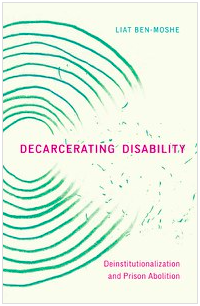 Decarcerating Disability by Liat Ben-Moshe. Liat Ben-Moshe provides case studies that show how prison abolition is not an unattainable goal but rather a reality, and how it plays out in different arenas of incarceration—antipsychiatry, the field of intellectual disabilities, and the fight against the prison-industrial complex. Her analysis of lived experience, history, and culture charts a way out of a failing system of incarceration.
Decarcerating Disability by Liat Ben-Moshe. Liat Ben-Moshe provides case studies that show how prison abolition is not an unattainable goal but rather a reality, and how it plays out in different arenas of incarceration—antipsychiatry, the field of intellectual disabilities, and the fight against the prison-industrial complex. Her analysis of lived experience, history, and culture charts a way out of a failing system of incarceration.https://www.upress.umn.edu/book-division/books/decarcerating-disability
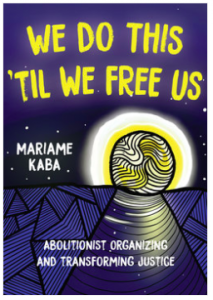 We Do This ‘Til We Free Us: Abolitionist Organizing and Transforming Justice by Mariame Kaba. What if social transformation and liberation isn’t about waiting for someone else to come along and save us? What if ordinary people have the power to collectively free ourselves? In this timely collection of essays and interviews, Mariame Kaba reflects on the deep work of abolition and transformative political struggle.
We Do This ‘Til We Free Us: Abolitionist Organizing and Transforming Justice by Mariame Kaba. What if social transformation and liberation isn’t about waiting for someone else to come along and save us? What if ordinary people have the power to collectively free ourselves? In this timely collection of essays and interviews, Mariame Kaba reflects on the deep work of abolition and transformative political struggle.
https://www.haymarketbooks.org/books/1664-we-do-this-til-we-free-us
 Sorrowland by Rivers Solomon. A genre-bending work of Gothic fiction. Here, monsters aren’t just individuals, but entire nations. It is a searing, seminal book that marks the arrival of a bold, unignorable voice in American fiction.
Sorrowland by Rivers Solomon. A genre-bending work of Gothic fiction. Here, monsters aren’t just individuals, but entire nations. It is a searing, seminal book that marks the arrival of a bold, unignorable voice in American fiction.
https://us.macmillan.com/books/9780374266776
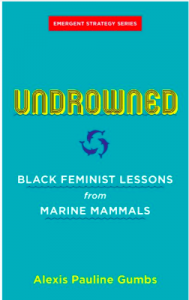 Undrowned: Black Feminist Lessons from Marine Mammals. Undrowned is a book-length meditation for the entire human species, based on the subversive and transformative lessons of marine mammals. Alexis Pauline Gumbs has spent hundreds of hours watching our aquatic cousins. She has found them to be queer, fierce, protective of each other, complex, shaped by conflict, and struggling to survive the extractive and militarized conditions humans have imposed on the ocean. Employing a brilliant mix of poetic sensibility, naturalist observation, and Black feminist insights, she translates their submerged wisdom to reveal what they might teach us. The result is a powerful work of creative nonfiction that produces not a specific agenda but an unfolding space for wonder and questioning.
Undrowned: Black Feminist Lessons from Marine Mammals. Undrowned is a book-length meditation for the entire human species, based on the subversive and transformative lessons of marine mammals. Alexis Pauline Gumbs has spent hundreds of hours watching our aquatic cousins. She has found them to be queer, fierce, protective of each other, complex, shaped by conflict, and struggling to survive the extractive and militarized conditions humans have imposed on the ocean. Employing a brilliant mix of poetic sensibility, naturalist observation, and Black feminist insights, she translates their submerged wisdom to reveal what they might teach us. The result is a powerful work of creative nonfiction that produces not a specific agenda but an unfolding space for wonder and questioning.
https://www.akpress.org/undrowned.html

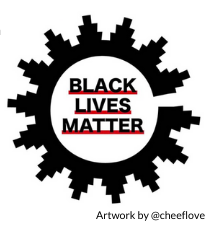
 Echoing POWER’s 2019 social media posts, blackatemerson, a new Instagram account, posed this simple question: “How have professors, administrators, and other Emersonians treated you?” In under a week’s time, over 115 students and alums, a majority who identify as Black or people of color, posted stories of their experiences at Emerson. These testimonies recount ongoing microaggressions, casual uses of the N-word, the fetishization and critique of Black women and their bodies, isolation from consistently being the only Black person in a setting, not seeing themselves reflected meaningfully in curricula, and expressions of what it feels like to be both hypervisible and invisible at the same time.
Echoing POWER’s 2019 social media posts, blackatemerson, a new Instagram account, posed this simple question: “How have professors, administrators, and other Emersonians treated you?” In under a week’s time, over 115 students and alums, a majority who identify as Black or people of color, posted stories of their experiences at Emerson. These testimonies recount ongoing microaggressions, casual uses of the N-word, the fetishization and critique of Black women and their bodies, isolation from consistently being the only Black person in a setting, not seeing themselves reflected meaningfully in curricula, and expressions of what it feels like to be both hypervisible and invisible at the same time. Where To Begin?
Where To Begin? If you or someone you know has been affected by power-based interpersonal violence, please feel free to contact Greta or Melanie in the Healing & Advocacy Collective by email:
If you or someone you know has been affected by power-based interpersonal violence, please feel free to contact Greta or Melanie in the Healing & Advocacy Collective by email: 


 And the people began to think differently. And the people healed. And, in the absence of people living in ignorant, dangerous, mindless, and heartless ways, the earth began to heal.
And the people began to think differently. And the people healed. And, in the absence of people living in ignorant, dangerous, mindless, and heartless ways, the earth began to heal.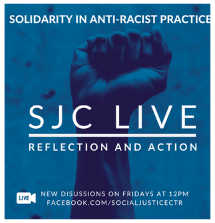 SJC LIVE is a virtual space for expanding our individual and collective capacities to manifest transformative social change. These Facebook Live conversations seek to center the people and work of racial justice movements, and call us into solidarity through anti-racist action. The videos from our five-part SJC LIVE series on anti-racist practices have been viewed by more than 2400 people, with our recent discussion on Abolition as an Anti-Racist Practice drawing more 600 viewers, including Emersonians out in the world as well as interested people with no connection to Emerson, from as far west as California and as far south as Florida. SJC LIVE is taking a brief hiatus but will be resuming soon with our next series focusing on Power, Violence, and Institutional Betrayals. In the meantime, all SJC LIVE videos can be found on our Facebook page at
SJC LIVE is a virtual space for expanding our individual and collective capacities to manifest transformative social change. These Facebook Live conversations seek to center the people and work of racial justice movements, and call us into solidarity through anti-racist action. The videos from our five-part SJC LIVE series on anti-racist practices have been viewed by more than 2400 people, with our recent discussion on Abolition as an Anti-Racist Practice drawing more 600 viewers, including Emersonians out in the world as well as interested people with no connection to Emerson, from as far west as California and as far south as Florida. SJC LIVE is taking a brief hiatus but will be resuming soon with our next series focusing on Power, Violence, and Institutional Betrayals. In the meantime, all SJC LIVE videos can be found on our Facebook page at 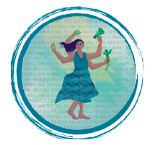 Healing & Advocacy Collective
Healing & Advocacy Collective Elma Lewis Center
Elma Lewis Center Identity-Based Harm (Bias) Incident Reports
Identity-Based Harm (Bias) Incident Reports The Pandemic is Portal – A Conversation with Arundhati Roy, Hosted by Imani Perry
The Pandemic is Portal – A Conversation with Arundhati Roy, Hosted by Imani Perry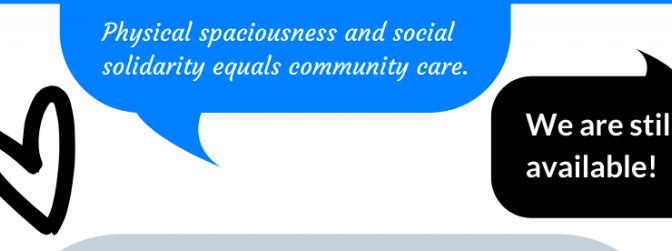

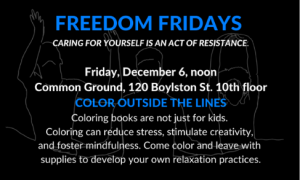
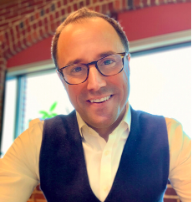 We are pleased to announce that Ryan Milligan will join the Emerson community as the new Deputy Title IX Coordinator & Investigator beginning January 6, 2020. We wish to extend our sincere gratitude to the Emerson students, staff, and faculty who were engaged and provided feedback during this search process.
We are pleased to announce that Ryan Milligan will join the Emerson community as the new Deputy Title IX Coordinator & Investigator beginning January 6, 2020. We wish to extend our sincere gratitude to the Emerson students, staff, and faculty who were engaged and provided feedback during this search process.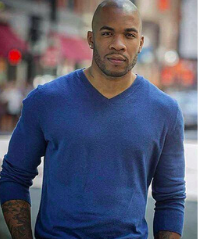
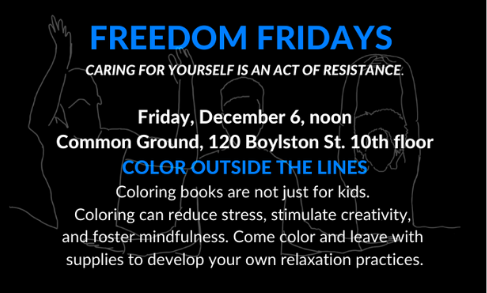
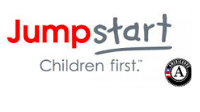
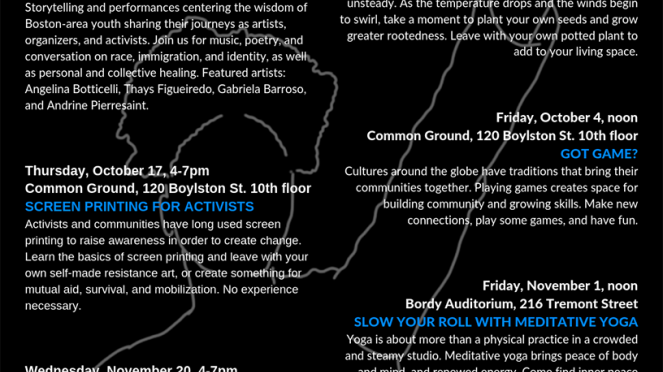
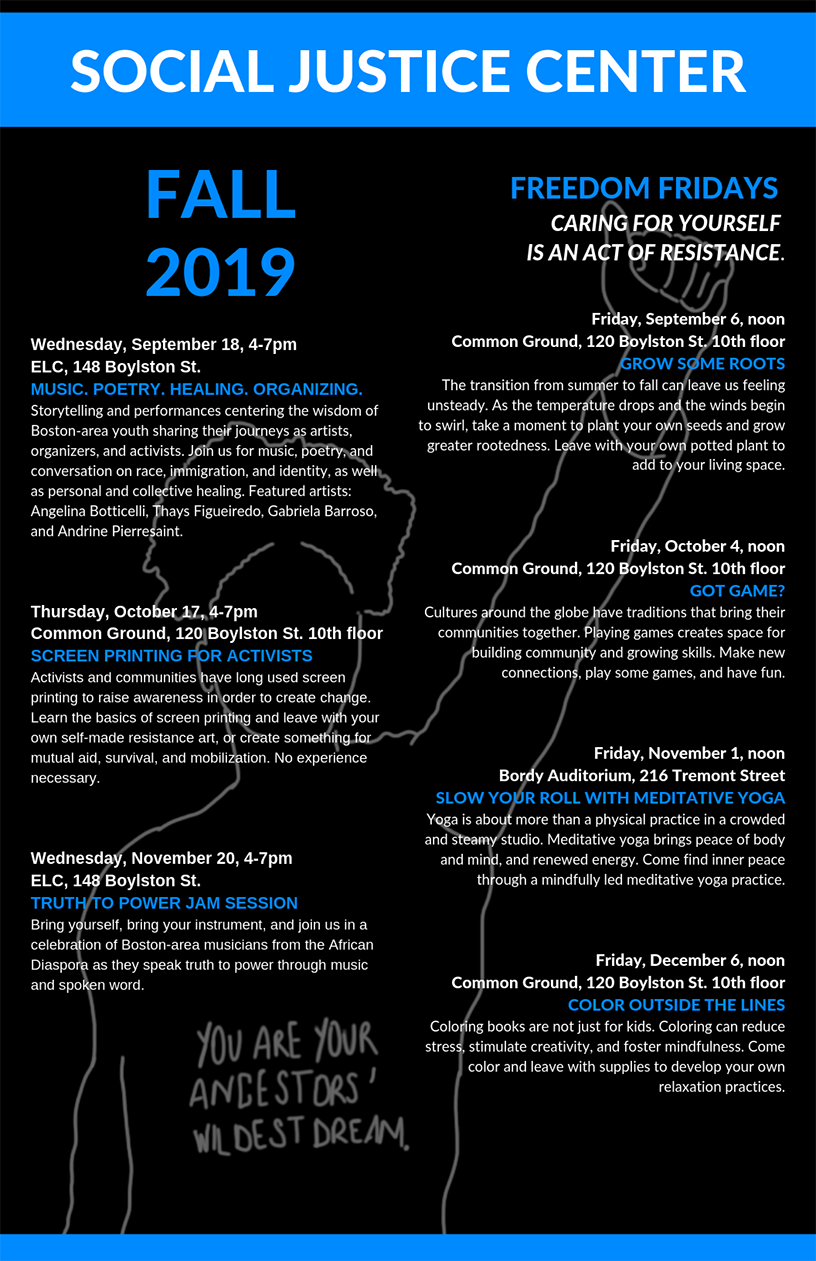
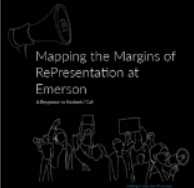
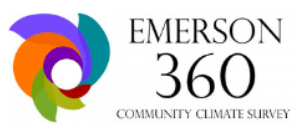 The Emerson360: Community Climate Student Survey, which focuses on student perceptions of general campus climate dimensions as well as topics related to power-based interpersonal violence, was administered during the fall semester. The survey had a 9% response rate, which is significantly lower than the response rate for the 2014 survey (32%). The following is a high-level summary of the findings from this year’s Emerson360: Student Survey.
The Emerson360: Community Climate Student Survey, which focuses on student perceptions of general campus climate dimensions as well as topics related to power-based interpersonal violence, was administered during the fall semester. The survey had a 9% response rate, which is significantly lower than the response rate for the 2014 survey (32%). The following is a high-level summary of the findings from this year’s Emerson360: Student Survey.

 Thank you, Suzanne.
Thank you, Suzanne.